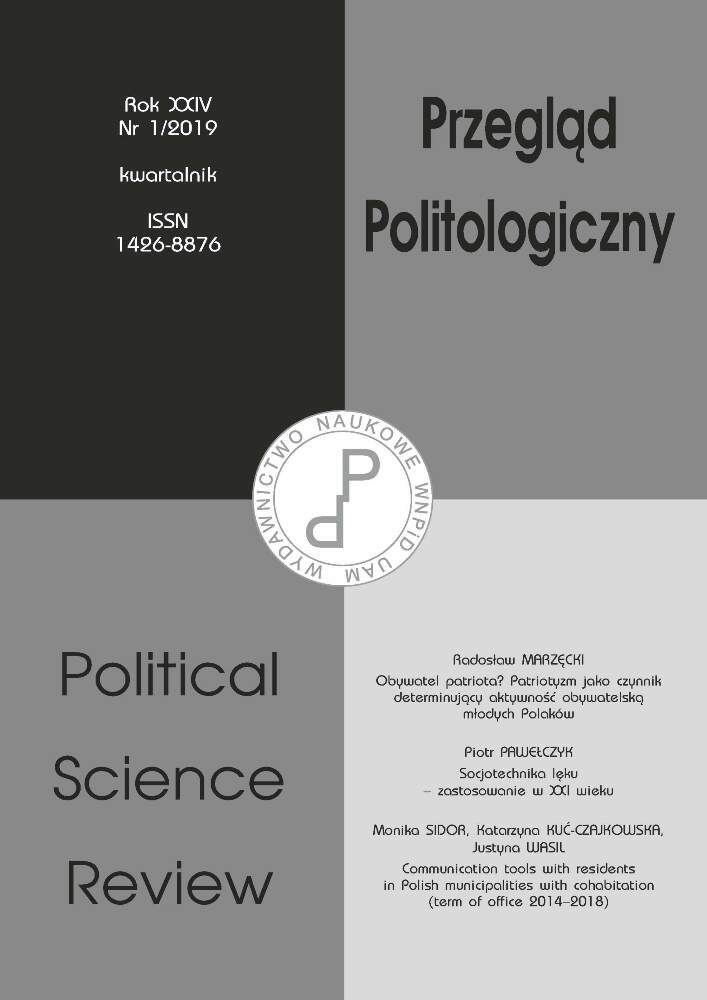Abstract
This paper discusses practical use of computer simulation techniques in social sciences, with particular reference to political science and sociology. The main subject of the research were agent-based simulation models (ABM), which is so far the most commonly used simulation technique in various disciplines, such as economics, sociology, anthropology, and behavioural sciences. Author provides an overview of two agent-based simulation models (the Schelling spatial segregation model and Axelrod- Hammond’s evolution of ethnocentrism model) with original implementations written in Python 3.6. The aim was to verify all the findings claimed by cited authors, as well as evaluate applied methodology. This paper emphasizes some research issues that need to be addressed with regard to veracity of simulation models in social sciences. It explains the necessary conditions for agent-based simulations to be recongnized as genuine research tool.
References
Axelrod R. M. (1997), The complexity of cooperation: agent-based models of competition and collaboration, Princeton.
Axelrod R. M. (2006), The evolution of cooperation, Cambridge.
Axelrod R. M., Hamilton W. D. (1981), The Evolution of Cooperation, „Science”, New Series, vol. 211, no. 4489.
Axelrod R. M, Hammond R. A. (2006), The Evolution of Ethnocentrism, „Journal of Conflict Resolution”, vol. 50, no. 6.
Bar-Yam Y. (1997), Dynamics of complex systems, Addison-Wesley.
Benenson I., Torrens P. M. (2005), Geosimulation: Automata-basedModeling of Urban Phenomena, San Francisco.
Bomba R. (2013), Narzędzia cyfrowe jako wyznacznik nowego paradygmatu badań humanistycznych, w: Zwrot cyfrowy w humanistyce, red. A. Radomski, R. Bomba, Lublin.
Chopard B. (1995), Complexity and Cellular Automata models, w: Physics of Complexity, red. S. Ciliberto, T. Dauxois, M. Droz, Singapur.
Downey A. B. (2016), Think Complexity, Needham.
Epstein J. M. (2005), Agent-Based Computational Models and Generative Social Science, w: Generative Social Science. Studies in Agent-Based Computational Modeling, red. J. M. Epstein, Princeton.
Epstein J. M., Axtell R. (1996), Growing Artificial Societies: Social Science from the Bottom Up, Brookings Institution Press, The MIT Press.
Feynman R. P., Leighton R. (2007), „Pan raczy żartować, panie Feynman!”. Przypadki ciekawego człowieka, Kraków.
Gilbert N., Troitzsch K. G. (2005), Simulation for the Social Scientist, New York.
Hoekstra A., Kroc J., Sloot P. (2010), Introduction to Modeling of Complex Systems Using Cellular Automata, w: Simulating Complex Systems by Cellular Automata, red. A. Hoekstra, J. Kroc, P. Sloot, London.
Kmiecik A. (2013), Filozoficzne aspekty komputerowych badań symulacyjnych w naukach społecznych, „FiloSofija”, nr 20 (1).
Lichtenstein B. (2014), Generative Emergence: A New Discipline of Organizational, Entrepreneurial, and Social Innovation, Oxford.
Lubiszewski D. (2011), Wyłaniające się prawa fizyki, „Diametros”, no. 28 (June).
McIntosh H. V. (2010), Conway’s Life, w: Game of Life Cellular Automata, red. A. Adamatzky, London.
Miller J. H., Page S. E. (2007), Complex Adaptive Systems an introduction to computational models of social life, Princeton.
Neumann J. von (1963), John Von Neumann Collected Works, vol. V, Oxford.
Pietraś Z. J. (1997), Teoria gier jako sposób analizy procesów podejmowania decyzji politycznych, Lublin.
Salgrado M., Gilbert N. (2013), Agent Based Modelling, w: Handbook of Quantitative Methods for Educational Research, red. T. Teo, Rotterdam-Boston-Taipei.
Sawyer R. (2005), Social Emergence Societies as Complex Systems, Cambridge.
Schelling T. C. (1971), Dynamic Models of Segregation, „Journal of Mathematical Sociology”, vol. 1.
Wainwright R. (2010), Conway’s Game of Life: Early Personal Recollections, w: Game of Life Cellular Automata, red. A. Adamatzky, London.
Weisfeld M. (2014), Myślenie obiektowe w programowaniu, Gliwice.

